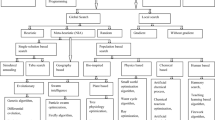Abstract
In recent years, the scale of the health examination business has increased rapidly, and research on the combinatorial optimization of medical examinations has become more important. In this context, a special large-scale flexible open shop scheduling problem (FOSP) is introduced based on the idea of the multi-processor open shop scheduling problem. A mixed integer programming model is developed for the FOSP, which regards client satisfaction as the most important objective. As the FOSP is particularly complex, three different intelligent optimization algorithms are examined, namely a genetic algorithm, hybrid particle swarm optimization, and simulated annealing. According to the medical examination preferences of the clients, a group of large-scale test problems are created on the basis of benchmark instances of the flexible job shop problem, and these are used to evaluate the performance of each algorithm. The experimental results show that the genetic algorithm outperforms both simulated annealing and hybrid particle swarm optimization, especially in large-scale problems.











Similar content being viewed by others
References
Abdelmaguid TF (2014) A hybrid PSO-TS approach for proportionate multiprocessor open shop scheduling. In: 2014 IEEE international conference on industrial engineering and engineering management, pp 107–111. https://doi.org/10.1109/IEEM.2014.7058610
Abdelmaguid TF, Shalaby MA, Awwad MA (2014) A tabu search approach for proportionate multiprocessor open shop scheduling. Comput Optim Appl 58(1):187–203. https://doi.org/10.1007/s10589-013-9621-0
Bai D, Zhang ZH, Zhang Q (2016) Flexible open shop scheduling problem to minimize makespan. Comput Oper Res 67:207–215
Chen H, Ihlow J, Lehmann C (1999) A genetic algorithm for flexible job-shop scheduling. In: IEEE international conference on robotics and automation, 1999. Proceedings, vol 2, pp 1120–1125
De Werra D, Kis T, Kubiak W (2008) Preemptive open shop scheduling with multiprocessors: polynomial cases and applications. J Sched 11(1):75–83
Goldansaz SM, Jolai F, Anaraki AHZ (2013) A hybrid imperialist competitive algorithm for minimizing makespan in a multi-processor open shop. Appl Math Model 37(23):9603–9616
Hasan SMK, Sarker R, Essam D, Cornforth D (2009) Memetic algorithms for solving job-shop scheduling problems. Memet Comput 1(1):69–83
Hu J, Jiang Y, Zhou P, Zhang A, Zhang Q (2017) Total completion time minimization in online hierarchical scheduling of unit-size jobs. J Comb Optim 33(3):866–881
Hurink J, Jurisch B, Thole M (1994) Tabu search for the job-shop scheduling problem with multi-purpose machines. Oper Res Spektrum 15(4):205–215
Khuri S, Miryala SR (1999) Genetic algorithms for solving open shop scheduling problems. Springer, Berlin, pp 357–368
Liu Q, Yuan J (2016) Online tradeoff scheduling on a single machine to minimize makespan and maximum lateness. J Comb Optim 32(2):385–395
Ma R, Yuan J (2017) Online scheduling to minimize the total weighted completion time plus the rejection cost. J Comb Optim 34(2):483–503
Matta ME (2009) A genetic algorithm for the proportionate multiprocessor open shop. Elsevier, New York
Matta ME, Elmaghraby SE (2010) Polynomial time algorithms for two special classes of the proportionate multiprocessor open shop. Eur J Oper Res 201(3):720–728
Naderi B, Fatemi Ghomi SMT, Aminnayeri M, Zandieh M (2010) A contribution and new heuristics for open shop scheduling. Comput Oper Res 37(1):213–221
Naderi B, Fatemi Ghomi SMT, Aminnayeri M, Zandieh M (2011) Scheduling open shops with parallel machines to minimize total completion time. J Comput Appl Math 235(5):1275–1287
Nagamani M, Chandrasekaran E (2015) Single objective for partial flexible open shop scheduling problem using hybrid particle swarm optimization algorithms. Indian J Sci Technol 8(35):1–6
Schuurman P, Woeginger GJ (1999) Approximation algorithms for the multiprocessor open shop scheduling problem. Oper Res Lett 24(4):157–163
Sevastianov SV, Woeginger GJ (2001) Linear time approximation scheme for the multiprocessor open shop problem. Discrete Appl Math 114(1):273–288
Wang D, Liu F, Yin Y, Wang J, Wang Y (2015) Prioritized surgery scheduling in face of surgeon tiredness and fixed off-duty period. J Comb Optim 30(4):967–981
Witkowski T, Antczak P, Antczak A (2011) Hybrid method for solving flexible open shop scheduling problem with simulated annealing algorithm and multi-agent approach. Adv Mater Res 383–390:4612–4619
Zhong L, Luo S, Wu L, Xu L, Yang J, Tang G (2014) A two-stage approach for surgery scheduling. J Comb Optim 27(3):545–556
Zhong X, Pan Z, Jiang D (2017) Scheduling with release times and rejection on two parallel machines. J Comb Optim 33(3):934–944
Acknowledgements
This work is supported by the National Natural Science Fund for Distinguished Young Scholars of China (61525304), National Natural Science Foundation of China (Nos. 61773120, 61473301, 71501180, 71501179 and 61603400). This work is also supported in part by the Program for New Century Excellent Talents in University, and Shenzhen Basic Research Project for Development of Science and Technology (JCYJ20160530141956915).
Author information
Authors and Affiliations
Corresponding author
Rights and permissions
About this article
Cite this article
Zhang, J., Wang, L. & Xing, L. Large-scale medical examination scheduling technology based on intelligent optimization. J Comb Optim 37, 385–404 (2019). https://doi.org/10.1007/s10878-017-0246-6
Published:
Issue Date:
DOI: https://doi.org/10.1007/s10878-017-0246-6




